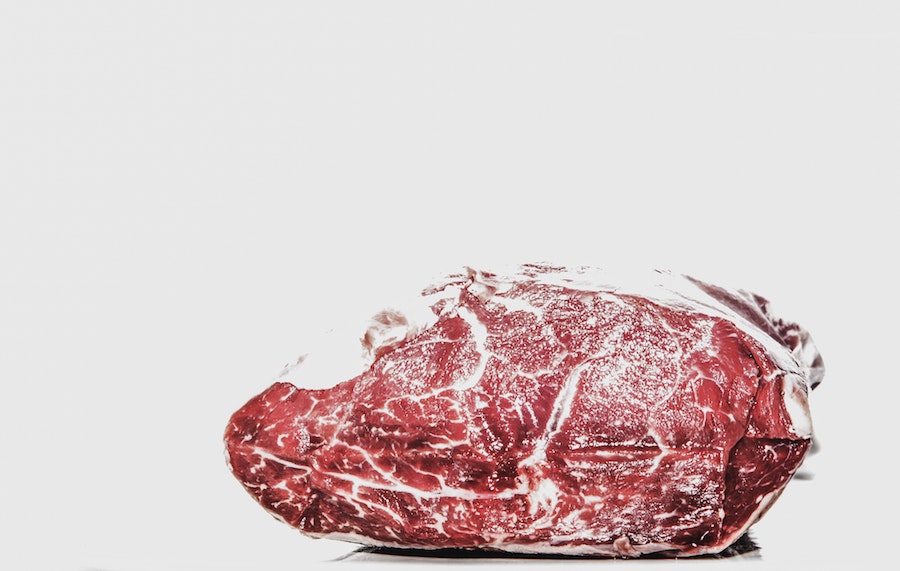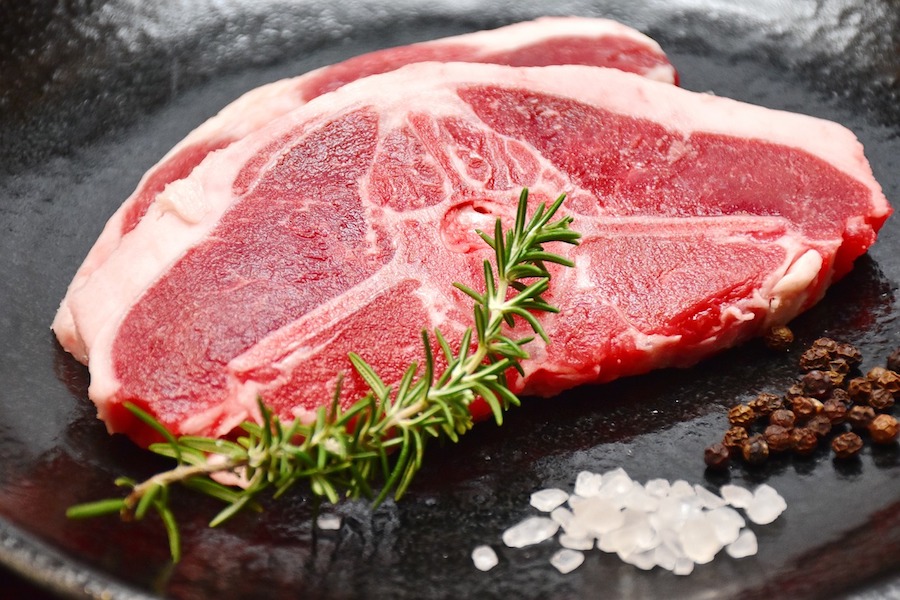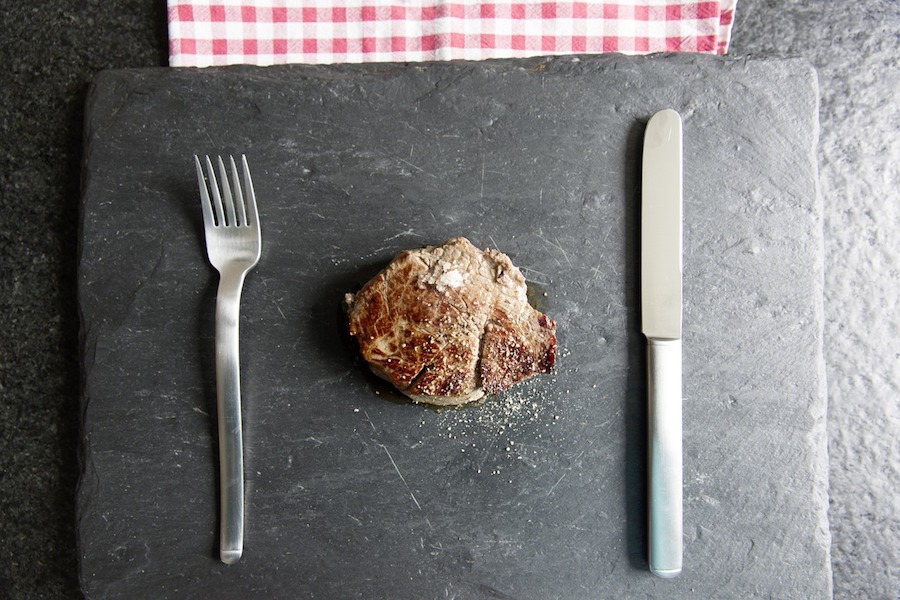If you’d thought extreme low-carb regimes had peaked with keto, remember that the human appetite for weird diets knows no bounds. Enter 2018’s fastest-growing nutrition trend and easily one of the most extreme diets imaginable: the carnivore diet.
“No,” we hear you whisper. “It can’t be what it sounds like.”
Oh, but it is.
What Is the Carnivore Diet?
The polar opposite of veganism, this diet advocates all meat, all the time. It should be grass-fed or pasture-raised. You can have eggs. Organ meat is a great idea. Maybe you can have some dairy, or perhaps dust your rib eye with some herbs and spices. (These last two points kind of depend on which faction you fall into.)
Nope, no vegetables. No, not even a fiber supplement. (Fiber is a carb, dummy.) No other supplements either.
The most confusing part? A lot of people on the diet appear to be improving their health.
Editor’s note: The content on BarBend is meant to be informative in nature, but it should not be taken as medical advice. The opinions and articles on this site are not intended for use as diagnosis, prevention, and/or treatment of health problems.
The best-known proponent of the diet is Shawn Baker, an orthopaedic surgeon who is publishing a book on the topic in early 2019. Canadian psychologist Jordan Peterson also follows it and swears it cured his daughter’s mysterious autoimmune problems. Many adherents report their blood markers improve. And pooping? Well…
Do Zero Carbers Poop?
Only the best poops of my life, is what you’ll often see on Zero Carb message boards. A common story is that there’s some fatigue the first few days, not much poop for the first week, then pooping comes back. The new poops are smaller and less frequent, but who wouldn’t like that?
Proponents like to point to studies like this one, published in 2012. Researchers put 63 people with chronic constipation on a no-fiber diet for two weeks, after which they could choose to reintroduce fiber to a level they were comfortable with. By the end of the six-month study most of them had been enjoying a no-fiber diet so much they hadn’t returned to consuming it. No carbers also said they no longer experienced bloating or difficulty going to the bathroom.
But you know what we have way more data showing? That fiber can lower your risk of heart disease, diabetes, and some forms of cancer.
Perhaps some people might benefit from temporarily eliminating fiber, like people with ulcerative colitis or some extreme, negative imbalance in their gut bacteria. Doing so might starve your “bad” bacteria and help to clear up some issues, but it’s kind of like burning down your house to kill a spider. You’ll lose a ton of good bacteria on the way, plus a lot of evidence is starting to suggest that a thriving population of gut bugs could improve your immunity and lower inflammation. Then again, you probably don’t need as much gut bacteria if you’re not eating any plants that need to be broken down.
The Carnivore Diet challenges you in more ways than one.
[Find out more in The Strength Athlete’s Guide to Gut Health.]
The Carnivore Diet and Scurvy
Dr. Mike T. Nelson, CSCS, an adjunct professor at the Carrick Institute whose PhD focused on metabolic flexibility, debated Shawn Baker earlier this year and shared his thoughts with BarBend on why these people aren’t keeling over from scurvy.
“With that you have to look at whether they’re consuming organ meats or not because I know the liver is pretty high in Vitamin C,” says Nelson. “But the recommended daily intake is pretty low and the amount you need to combat scurvy is stupid low. There was a case report of someone living off of bread and cheese sandwiches for two years before being diagnosed with scurvy. Even now, when you think about how crappy people’s diets are across the board, there’s so little scurvy.”
He wouldn’t be surprised if someone lasted a good few months with zero Vitamin C in their diet, but there are other explanations as to why people are surviving the diet with their gums in tact.
“The reason you don’t get scurvy from a diet like that is because when you get low enough on Vitamin C, you have a genetically switched on neurological hunger pathway that makes you crave citrus fruit,” says Dr. Mike Israetel, the assistant professor of nutrition, exercise science, and public health at Temple University and co-founder of Renaissance Periodization. “When you go that low, you will crave an orange like you wouldn’t believe possible. And you will consume it. These people do not have perfect dietary adherence. Nobody does, certainly not people who do fad diets.”
In other words, people cheat — hard-to-follow diets are hard to follow. A popular 2015 survey of almost two thousand British vegetarians, for example, found that more than a third of them eat meat when they’re drunk and most of them don’t admit it to anyone. And it seems a heck of a lot easier to go vegetarian than carnivore.
We’re sure a lot of Zero Carbers do happily and successfully eliminate plants — maybe even without adding liver — let’s just remember that people talk more loudly about their successes than their failures.
The most common retort given to the scurvy question by Zero Carbers themselves is that Vitamin C and glucose use the same pathway, so if you’re not eating any carbs then you need much less Vitamin C than the average person. Some studies have suggested glucose levels do affect Vitamin C levels and vice versa, which has implications for people who are hyperglycemic.(1)(2)(3) For regular people, says Israetel, it’s “completely insane.”
The Carnivore Diet and Overall Health
“The diet is the peak of absurdity and highly unsustainable.”
He concedes that it may have some demonstrable positives for certain individuals, like those who can’t control cravings for certain foods. They eat two or three all-meat meals a day (restricting the feeding window to two large meals is common), the protein and fat is pretty satiating, they wind up eating fewer calories, they lose weight.
“And since weight loss is a huge driver of overall health, it can overwhelm the negatives of the restricted eating and be a net positive,” he says. “Individuals reporting great results from the Carnivore Diet will be from weight loss.”
Remember the Twinkie diet? In 2010 a professor of human nutrition at Kansas State University ate a Twinkie every three hours for two months and lost 27 pounds. People don’t always report that he also consumed a daily protein shake, multivitamin, and can of vegetables, but two thirds of his diet was junk food and he improved his LDL and HDL cholesterol while reducing his triglycerides by 39 percent.
The moral of the story is that he just ate fewer calories than he burned and despite all the crap in his diet, the body reacts really positively to losing weight. And few things help the average person lose weight as well as abolishing entire food groups. (Another thing that’s good for? Removing foods to which you may have undiagnosed sensitivities.)
All of sudden you feel better than you remember.
Humans can survive on a lot of extreme diets that appear to miss a lot of nutrients (like the Standard American Diet, hey-o), but we just can’t ignore the very, very, very, very large body of evidence that suggests fruits and vegetables are, you know, good for you.
“If you have to pick the three most micronutrient-dense food categories I’d say vegetables, fruit, and whole grains,” says Israetel. “Add lean meats to that group and you get the best nutrition you possibly can. If you look at any of the meta analytic data, individuals who predominantly eat those are the healthiest people on Earth.”
Meat does have a ton of very bioavailable nutrients. It’s also a really good idea to eat plants.
“My guess is you’re probably not going to see a lot of frank deficiencies, but my bias is toward the full spectrum of nutrients,” says Nelson. “The human body is so flexible, most people survive on the average American diet. You can eat utter crap and function for a while. But I don’t know if you should follow (The Carnivore Diet) for the rest of your life just because it worked for eight weeks, especially if you don’t have dietary restrictions.”
Wrapping Up
Many people who follow fad diets burn out, go to the next fad diet, say that diet saved them, burn out, watch another documentary on another diet, and so on.
It seems we can’t deny that some people appear to enjoy positive effects from the Carnivore Diet but it would be irresponsible to recommend ignoring every single nutrition school on Earth. While there is a very small amount of data showing some positive results for some people who eliminated fiber, there are no studies to suggest that the Carnivore Diet is anything anyone should follow.
We can’t stop you from trying it and for certain people it might even be helpful for a time. But not many reputable authorities in any field are saying it’s a good idea.
References
1. Chen L, et al. Hyperglycemia inhibits the uptake of dehydroascorbate in tubular epithelial cell. Am J Nephrol. 2005 Sep-Oct;25(5):459-65.
2. Malo, C. et al. Glucose modulates vitamin C transport in adult human small intestinal brush border membrane vesicles. J Nutr. 2000 Jan;130(1):63-9.
3. Dakhale GN, et al. Supplementation of vitamin C reduces blood glucose and improves glycosylated hemoglobin in type 2 diabetes mellitus: a randomized, double-blind study. Adv Pharmacol Sci. 2011;2011:195271.





